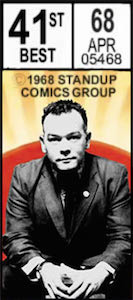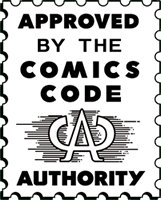What Happened to Counter-Culture? - 7th August 2025
Press for What Happened to Counter-Culture? will collect here.
More than just a cultural trend – counter-culture became a social movement so powerful it shaped institutions, businesses, politics and the attitudes and aspirations of whole generations – including everything from haircuts to voting choices. In fact, it became so prevalent that it’s sometimes hard to remember how things have changed under its influence.
Comedian Stewart Lee presents a five-part series exploring the evolution and key ideas that have driven counter-culture from its beginnings with the Beats, folk and jazz in the 1950s, to its heights in the 1960s and 70s including the hippies and the early tech-communalists, the new liberation movements and punk, to the 1980s and early 90s, where political power on both sides of the Atlantic pushed back against the values of the ‘permissive society’.
Talking to artists, musicians, writers, activists and historians, Stewart continues to the present day asking where we are now, in the digital age of social media silos and the so-called ‘culture wars’ – what’s happened to counter-culture? Was it co-opted, did it sell out? Or did its ideas of freedom and identity become so entrenched within mainstream culture it’s legacy has become unassailable? Or has it migrated politically to the Right? Throughout the series, the counter-culture is explored not only in terms of its history, extraordinary cultural output and key events – but also its deeper political and philosophical impact, its continued meaning for our own age.
Part 1, Absolute Beginners, explores why the counter-culture happened when it did and the uniquely placed generation driving it forwards – the Beat poets, the folk scene and its ties to the growing peace movement. A younger generation rejected ideas of security and hyper-conformity – a fear of the automated society and of a repressed ‘One Dimensional Man’ – the life being lived by their parents, still shaken by World War Two. Freedom and self-expression would become the new currency and poet Alan Ginsberg’s Howl (1956) heralds the start of an unstoppable movement.
Contributors include musician Brian Eno, authors Iain Sinclair and Olivia Laing, music producer Joe Boyd, sculptor Emily Young, cultural historian Jon Savage and folk singer Shirley Collins, with Ian Kearey playing The Instrument.
Part 2: Revolution in the Head. Against the growing political turmoil of the 1960s, this episode looks at the growing counter-culture as first of all a revolution in the head – the changing ideas of freedom and liberation, the power of psychedelics and rock, all culminating in 1967’s Human Be-In and Summer of Love. In London, a network of underground presses, clubs and bookshops, happenings and events like the 14 Hour Technicolour Dream channel the underground in contrast to mainstream culture. But the lines between the counterculture and the mainstream are beginning to blur, as Bob Dylan’s decision to ‘plug in’ at Newport is condemned by the folk scene as selling out, even as the new sound electrifies the underground. The Beatles in particular were a bridge between the ideas of the counter-culture and popular success. The years from 1966-7 especially are a golden age for the counter-culture, where many of its key ideas become entrenched – seemingly progressive, but later weaponised by its opponents. It championed a liberation of the individual against society, but to what ends?
Contributors include music producer Joe Boyd, songwriter and guitarist Johnny Marr, author Olivia Laing, founder of Rolling Stone magazine Jann Wenner, Woodstock photographer Lisa Law, founding member of Blondie and author Gary Lachman, stone carver Emily Young, historian Peter Oborne, journalist and writer John Harris, author Lynsey Hanley, musician and songwriter Robyn Hitchcock and David Cunningham, who writes on 20th century art movements.
Part 3: Beauty In The Streets – Leading to the revolt and turbulence of May 68 in Paris, London and around the world, this episode explores how the ‘revolution in the head’ fuses with the revolution in the streets as counter-culture becomes more expressly political and actively dangerous to the forces of order. From attempts to levitate the Pentagon in Washington to organising conferences on liberation and violence in London, Stewart investigates the influence of the Avant Garde in the politics of ‘68 in Paris, of the flourishing of Black counter-culture and free jazz in America, especially the work of musician Sun Ra. ‘Happenings’ in London become more participatory and political, anticipating future technologies – even as the new tech-communalists of the West Coast dream of a fully networked planet, laying the foundations for the internet in the name of a non-hierarchical counter-culture.
Contributors include musician Damon Albarn and artist Hazel Albarn, author Iain Sinclair, journalist and author John Harris, founding member of Blondie and specialist on counter-culture and the occult Gary Lachman, poet Sonia Sanchez, author and critic Kevin Le Gendre, artist Nelly Ben Hayoun, French historian Richard Vinen, writer on cyber-culture Fred Turner and author-musician Robyn Hitchcock.
In part 4, Culture Clash, the counter-culture generates opposition of its own – first in the courts and then from government. As the infamous Oz magazine trial puts the British underground press in the dock for ‘corrupting public morals’, the UK underground extends outside London to urban communities across the country, creating vibrant, alternative scenes in the 1970s and 80s, despite growing opposition from government.
Punk re-energises some of the same counter-cultural, DIY values as the hippie movement and joins with reggae, by now the music of Black British counter-culture, to form a powerful, multifaceted cultural challenge to mainstream politics and society.
But has the free individualism of the 1960s become hardened and monetised into a version of its own worst enemy – the economic self-centredness of the 1980s? This episode explores the pushback – a political ‘counter’ counter-culture – led by the Thatcher and Reagan governments respectively, explicitly opposing the ideas of the ‘permissive society’ and 1960s counter-culture in Britain and America. In the UK, following its success defeating the NUM, the Conservative government targets the alternative culture of ‘new age travellers’ culminating with the ‘Battle of the Beanfield’ in June 1985, one of the most violent police operations in British history.
Contributors include journalist and author John Harris, photographer Lisa Law, former Oz and IT journalist Jonathon Green, Geoffrey Robertson KC, musician Brian Eno, critic and author Paul Morley, historian Andy Beckett, founding member of Steel Pulse and director of the Black Music Research Unit Mykaell Riley, fashion designer and founding member of XR Clare Farrell, historian and journalist Simon Heffer, guitarist and songwriter Johnny Marr, and photographer Alan Lodge.
Part 5 – Interzone explores the confluence of the early rave scene and new waves of eco-protest in the late 80s/early 90s as possibly the last great counter culture in the UK before the arrival of the internet. Meanwhile the online world has made the idea and actuality of counter-culture much more difficult. Our far more fragmented digital society means there is no ‘mono’ culture or single idea of ‘the Establishment’ to push back against, as there was in the 1950s and ’60s. Or has counter-culture become redundant – a victim of its own success, no longer necessary because historically it won many of it its key arguments? Others worry such gains are fragile and easily reversed. Despite their roots in the counter-culture, the tech companies have become a powerful force in society – would a new counter-culture mean disconnection before we can reconnect again?
Contributors include DJ and producer Norman Cook aka Fatboy Slim, musician and songwriter Damon Albarn, journalist and author John Harris, musician Brian Eno, founding member of Hard Art and fashion designer Clare Farrell, author and critic Olivia Laing, musician Nick Saloman, former managing editor of Rolling Stone Ed Needham, founder of Rolling Stone Jann Wenner, author and critic Kevin Le Gendre, historian of cyber culture Fred Turner and artist Jeremy Deller.
Danny Robins’ Uncanny
Great Lives: Derek Bailey
Online Critiques
Contrapuntal, Twitter
Contrapuntal, Twitter
Foxfoxton, Youtube
Foxfoxton, Youtube
Someoneyoudon'tknow, Chortle.com
Someoneyoudon'tknow, Chortle.com
Meanstreetelite, Peoplesrepublicofcork
Meanstreetelite, Peoplesrepublicofcork
Gwaites, Digitalspy
Gwaites, Digitalspy
Anonymous, The Northfield Patriot
Anonymous, The Northfield Patriot
Idrie, Youtube
Idrie, Youtube
Guest, Dontstartmeoff.com
Guest, Dontstartmeoff.com
Johnny Kitkat, dontstartmeoff.com
Johnny Kitkat, dontstartmeoff.com
Zombie Hamster, Twitter
Zombie Hamster, Twitter
Dominic Cavendish, Daily Telegraph
Dominic Cavendish, Daily Telegraph
Ishamayura Byrd, Twitter
Ishamayura Byrd, Twitter
NevW47479, UKTV.co.uk
NevW47479, UKTV.co.uk
Fowkes81, Twitter
Fowkes81, Twitter
Pnethor, pne-online.com
Pnethor, pne-online.com
Jamespearse, Twitter
Jamespearse, Twitter
Hiewy, Youtube
Hiewy, Youtube
Stokeylitfest, Twitter
Stokeylitfest, Twitter
Nicetime, Guardian.co.uk
Nicetime, Guardian.co.uk
Mearecate, Youtube
Mearecate, Youtube
Aiden Hearn, Twitter
Aiden Hearn, Twitter
Robert Gavin, Twitter
Robert Gavin, Twitter
Anon, BBC Complaints Log
Anon, BBC Complaints Log
Horatio Melvin, Twitter
Horatio Melvin, Twitter
Coxy, Dontstartmeoff.com
Coxy, Dontstartmeoff.com
Dick Socrates, Twitter
Dick Socrates, Twitter
Alwyn, Digiguide.tv
Alwyn, Digiguide.tv
Tokyofist, Youtube
Tokyofist, Youtube
Cojones2, Guardian.co.uk
Cojones2, Guardian.co.uk
Slothy Matt, Twitter
Slothy Matt, Twitter
Aaron, comedy.co.uk
Aaron, comedy.co.uk
A D Ward, Twitter
A D Ward, Twitter
Pirate Crocodile, Twitter
Pirate Crocodile, Twitter
Microcuts 22, Twitter
Microcuts 22, Twitter
Secretdeveloper, Youtube
Secretdeveloper, Youtube
Cabluigi, Guardian.co.uk
Cabluigi, Guardian.co.uk
Tweeterkiryakou, Twitter
Tweeterkiryakou, Twitter
Pudabaya, Twitter
Pudabaya, Twitter
Dave Wilson, Chortle.com
Dave Wilson, Chortle.com
Mpf1947, Youtube
Mpf1947, Youtube
Brighton Argus
Brighton Argus
Mrdavisn01, Twitter
Mrdavisn01, Twitter
Bosco239, youtube
Bosco239, youtube
Jackmumf, Twitter
Jackmumf, Twitter
Tin Frog, Twitter
Tin Frog, Twitter
Esme Folley, Actress, cellist, Twitter
Esme Folley, Actress, cellist, Twitter
12dgdgdgdgdgdg, Youtube
12dgdgdgdgdgdg, Youtube
Dahoum, Guardian.co.uk
Dahoum, Guardian.co.uk
Peter Ould, Youtube
Peter Ould, Youtube
Funday’schild, youtube.
Funday’schild, youtube.
Clampdown59, Twitter.
Clampdown59, Twitter.
Rowing Rob, Guardian.co.uk
Rowing Rob, Guardian.co.uk
Guest1001, Youtube
Guest1001, Youtube
Len Firewood, Twitter
Len Firewood, Twitter
Genghis McKahn, Guardian.co.uk
Genghis McKahn, Guardian.co.uk
Leach Juice, Twitter
Leach Juice, Twitter
Danazawa, Youtube
Danazawa, Youtube
Al Murray, Comedian
Al Murray, Comedian
DVDhth's grandparents, Twitter
DVDhth's grandparents, Twitter
Lents, redandwhitekop.com
Lents, redandwhitekop.com
Visualiser1, Twitter
Visualiser1, Twitter
Frankie Boyle, Comedian
Frankie Boyle, Comedian
BBC iPlayer edition of discussion of Stewart Lee on A Good Read
BBC iPlayer edition of discussion of Stewart Lee on A Good Read
Cyberbloke, Twitter
Cyberbloke, Twitter
Neolab, Guardian.co.uk
Neolab, Guardian.co.uk
Karen Laidlaw, Edfringe. com.
Karen Laidlaw, Edfringe. com.
Rudeness, Youtube
Rudeness, Youtube
Syhr, breakbeat.co.uk
Syhr, breakbeat.co.uk
Richard Herring, Comedian
Richard Herring, Comedian
Joskins, Leeds Music Forum
Joskins, Leeds Music Forum
Carla, St Albans, Dailymail.co.uk
Carla, St Albans, Dailymail.co.uk
Bobby Bhoy, Twitter
Bobby Bhoy, Twitter
Kozzy06, Youtube
Kozzy06, Youtube
General Lurko 36, Guardian.co.uk
General Lurko 36, Guardian.co.uk
Anon, westhamonline.com
Anon, westhamonline.com
Etienne, Chortle.com
Etienne, Chortle.com
Gabrielle, Chortle.com
Gabrielle, Chortle.com
Dominic Cavendish, Telegraph
Dominic Cavendish, Telegraph
Shane, Beverley, Dailymail.co.uk
Shane, Beverley, Dailymail.co.uk
Chez, Chortle.com
Chez, Chortle.com
Carcrazychica, Youtube
Carcrazychica, Youtube
Lee Mack, Mack The Life, 2012
Lee Mack, Mack The Life, 2012
Rubyshoes, Twitter
Rubyshoes, Twitter
FBC, finalgear.com
FBC, finalgear.com
Peter Fears, Twitter
Peter Fears, Twitter
Yukio Mishima, dontstartmeoff.com
Yukio Mishima, dontstartmeoff.com
Henry Howard Fun, Twitter
Henry Howard Fun, Twitter
Whoiscuriousgeorge, Youtube
Whoiscuriousgeorge, Youtube
Emilyistrendy, Youtube
Emilyistrendy, Youtube
Joycey, readytogo.net
Joycey, readytogo.net
Keilloh, Twitter
Keilloh, Twitter
World Without End, Twitter
World Without End, Twitter
Liam Travitt, Twitter
Liam Travitt, Twitter
Sidsings000, Youtube
Sidsings000, Youtube
Stuart, Chortle
Stuart, Chortle
Spanner, dontstartmeoff.com
Spanner, dontstartmeoff.com
Birmingham Sunday Mercury
Birmingham Sunday Mercury
Tweeter Kyriakou, Twitter
Tweeter Kyriakou, Twitter
Lenny Darksphere, Twitter
Lenny Darksphere, Twitter
Sweeping Curves, Twitter
Sweeping Curves, Twitter
Z-factor, Twitter.
Z-factor, Twitter.
Mini-x2, readytogo.net
Mini-x2, readytogo.net
Alex Quarmby, Edfringe.com
Alex Quarmby, Edfringe.com
John Robins, Comedian
John Robins, Comedian
Anamatronix, Youtube
Anamatronix, Youtube
Iain, eatenbymissionaries
Iain, eatenbymissionaries
Deepbass, Guardian.co.uk
Deepbass, Guardian.co.uk
Tres Ryan, Twitter
Tres Ryan, Twitter
Borathigh5, Youtube
Borathigh5, Youtube
Peter Ould, Twitter
Peter Ould, Twitter
Anonymous, don'tstartmeoff.com
Anonymous, don'tstartmeoff.com
Anon, dontstartmeoff.com
Anon, dontstartmeoff.com
Lucinda Locketts, Twitter
Lucinda Locketts, Twitter
Meninblack, Twitter
Meninblack, Twitter
Shit Crit, Twitter
Shit Crit, Twitter
Lancethrustworthy, Youtube
Lancethrustworthy, Youtube
Fairy Pingu, Twitter
Fairy Pingu, Twitter
Neva2busy, dontstartmeoff.com
Neva2busy, dontstartmeoff.com
GRTak, finalgear.com
GRTak, finalgear.com
Joe, Independent.co.uk
Joe, Independent.co.uk
Wharto15, Twitter
Wharto15, Twitter
98rosjon, Twitter
98rosjon, Twitter
Sam Rooney, Youtube
Sam Rooney, Youtube
Maninabananasuit, Guardian.co.uk
Maninabananasuit, Guardian.co.uk
Patrick Kavanagh, Guardian.co.uk
Patrick Kavanagh, Guardian.co.uk
Brendon, Vauxhallownersnetwork.co.uk
Brendon, Vauxhallownersnetwork.co.uk
Gmanthedemon, bbc.co.uk
Gmanthedemon, bbc.co.uk
Pudabaya, beexcellenttoeachother.com
Pudabaya, beexcellenttoeachother.com
James Dellingpole, Daily Telegraph
James Dellingpole, Daily Telegraph

